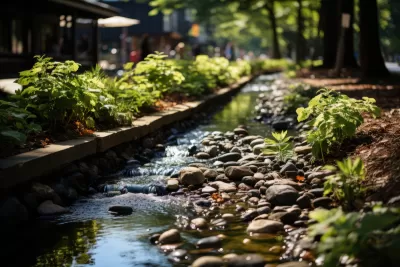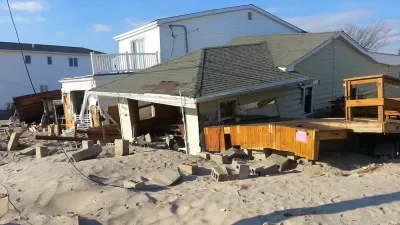A new loan program reduces the bureaucratic hurdles to implementing small-scale climate adaptation projects.

An article by Jake Bittle in Grist describes a new loan program for climate adaptation projects that specifically aims to support small-scale projects in smaller towns and tribal communities. “This way, not only can local officials representing small towns, minor cities, and tribes skip the extensive application process associated with federal grants, but they also don’t have to justify their projects in cost-benefit terms.”
The program could help speed up smaller adaptation projects that could have a significant impact on their community’s ability to withstand extreme weather events and climate change, reducing the red tape that communities must navigate for most federal grant or loan programs. Bittle explains that “Because states themselves will be running the loan programs, rather than the federal government, borrowers won’t have to worry about following the extensive federal spending guidelines that often hamper adaptation projects, or about passing a strict cost-benefit analysis.
According to Bittle, “The agency is piloting the program by sending $50 million in ‘seed capital’ to seven states — Louisiana, Maryland, Michigan, New Jersey, New York, South Carolina, and Virginia — as well as Washington, D.C. The states will get about $6 million each, and they’ll be able to loan that money out to smaller governments at interest rates of less than 1 percent.”
FULL STORY: FEMA rolls out climate adaptation loans for small and overlooked communities

Trump Administration Could Effectively End Housing Voucher Program
Federal officials are eyeing major cuts to the Section 8 program that helps millions of low-income households pay rent.

Planetizen Federal Action Tracker
A weekly monitor of how Trump’s orders and actions are impacting planners and planning in America.

Ken Jennings Launches Transit Web Series
The Jeopardy champ wants you to ride public transit.

Rebuilding Smarter: How LA County Is Guiding Fire-Ravaged Communities Toward Resilience
Los Angeles County is leading a coordinated effort to help fire-impacted communities rebuild with resilience by providing recovery resources, promoting fire-wise design, and aligning reconstruction with broader sustainability and climate goals.

When Borders Blur: Regional Collaboration in Action
As regional challenges outgrow city boundaries, “When Borders Blur” explores how cross-jurisdictional collaboration can drive smarter, more resilient urban planning, sharing real-world lessons from thriving partnerships across North America.

Philadelphia Is Expanding its Network of Roundabouts
Roundabouts are widely shown to decrease traffic speed, reduce congestion, and improve efficiency.
Urban Design for Planners 1: Software Tools
This six-course series explores essential urban design concepts using open source software and equips planners with the tools they need to participate fully in the urban design process.
Planning for Universal Design
Learn the tools for implementing Universal Design in planning regulations.
Ada County Highway District
Clanton & Associates, Inc.
Jessamine County Fiscal Court
Institute for Housing and Urban Development Studies (IHS)
City of Grandview
Harvard GSD Executive Education
Toledo-Lucas County Plan Commissions
Salt Lake City
NYU Wagner Graduate School of Public Service





























